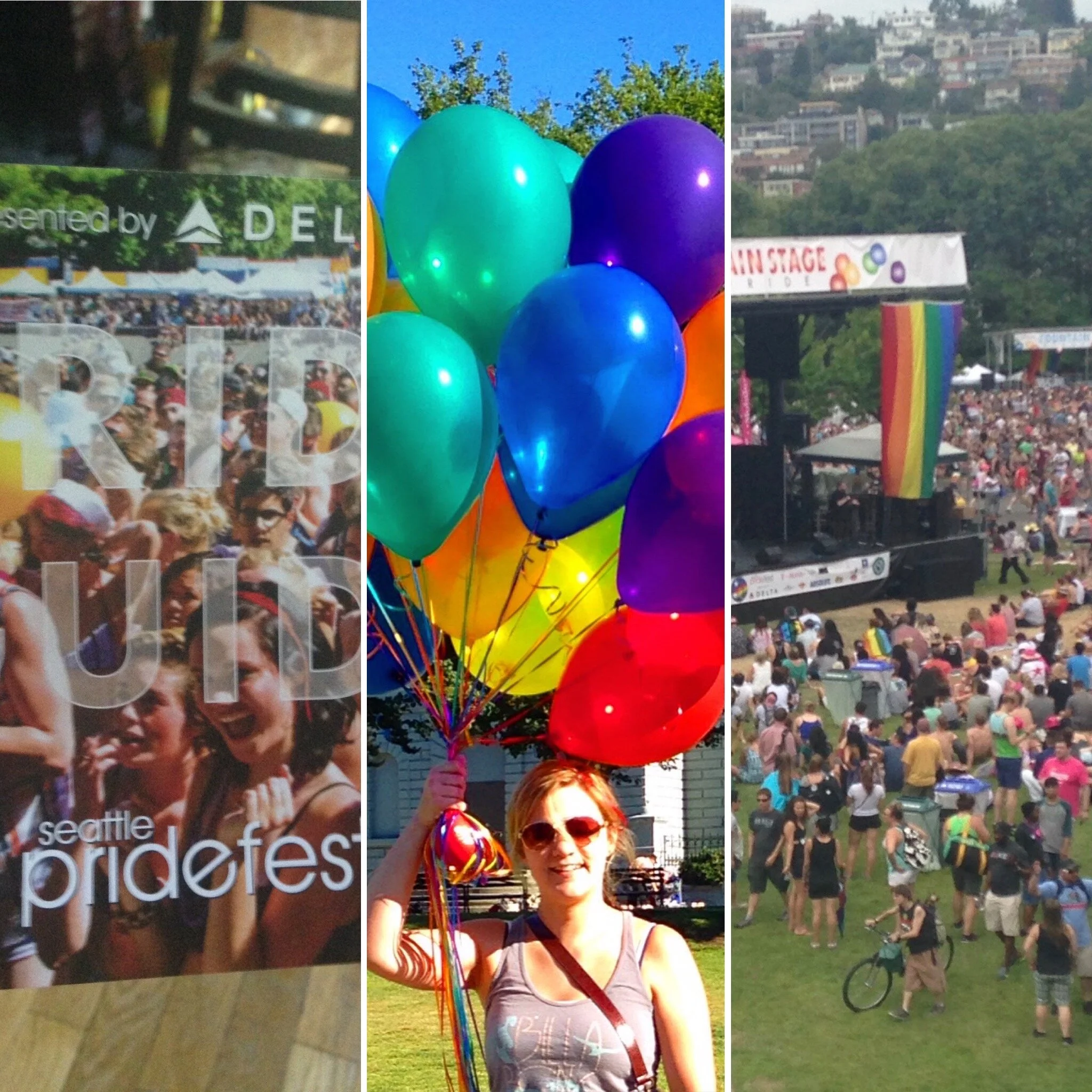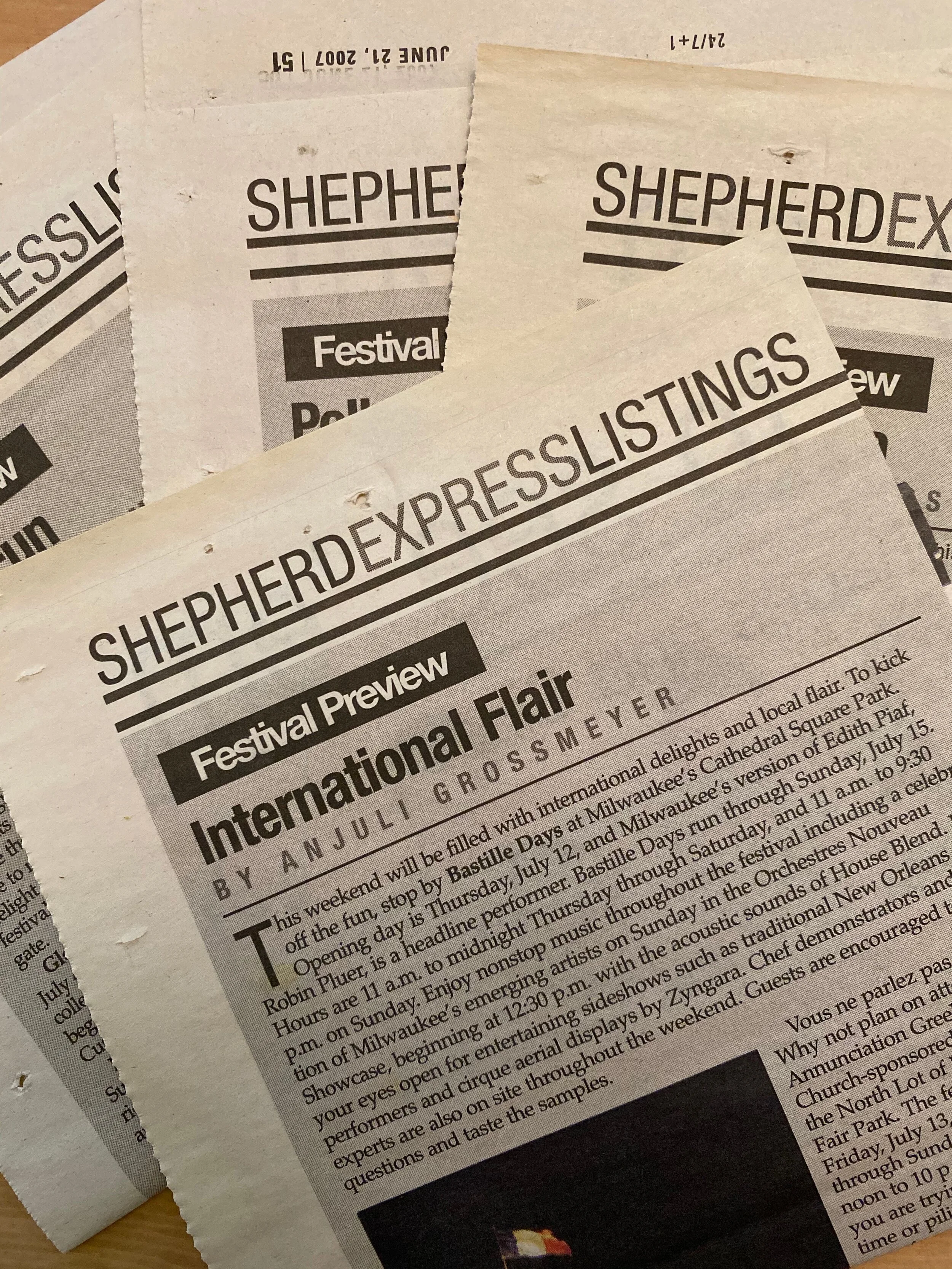Space to Celebrate Freedom
It is Pridefest Sunday in Seattle, Washington. The year is 2015. I am about to participate as assistant to the festival director for what is considered one the largest free Pride events in the nation. I’m driving south on 99 toward Seattle Center listening to a news station reporting on the Supreme Court Ruling on marriage equality. The broadcaster quotes Justice Kennedy, “No union is more profound than marriage, for it embodies the highest ideals of love, fidelity, devotion, sacrifice and family. In forming a marital union, two people become something greater than once they were.” I’m moved to tears even as I think of my own, heteronormative marriage, which has occurred just months before. When I get to Seattle Center, I run into the Festival Director who smiles ear-to-ear. When I ask him how he is feeling, he responds, “I feel Equal.”
I have always loved festivals. In the city of Milwaukee, near my hometown, summer equals festivals. Wisconsinites will use any and every excuse to gather in a beer garden, eat anything fried (on a stick!), and listen to music. From Jazz in the Park to Bastille Days, from Irish Fest to Festa Italiana. Give me the smell of a fried dough, pour me a cold MGD, set me down in front of a stage and let me enjoy the cacophony of sound, the myriad of faces, and the heat of a summer sun.
I guess it’s no surprise that I found myself working in event production for a time. I’ve worked in food truck round-ups, marketing activations, community clean-up projects. While I haven’t worked in event production in a few years, my heart breaks as I see yet another familiar festival organizer cancel their events for 2020. I understand the loss that this means to communities, small-businesses, and production teams. Don’t get me wrong, as the weight of COVID lingers without a vaccine, and the reality of over-worked, overwhelmed healthcare providers persists, I get it. There are immune-compromised members in my family and I see the need to continue what many think are unnecessary social distancing practices.
Now enter the advent of what is being defined as the civil rights movement of my generation. Thousands gather to march, to protest, to stand and amplify the voices of those whom systemic racism has tried to silence and invalidate. And in the midst of this movement, I hear the name of a festival I know nothing about.
Juneteenth.
In the most simplest of terms, it’s a celebration of the emancipation of Black people. On June 19th, 1865, more than two years after the Emancipation Proclamation was issued, Major General Gordon Granger brought news of the end of the Civil War and the freedom for all enslaved peoples to Galveston, Texas. Sounds amazing! Why haven’t I heard of it before?
That is, I have heard the name before, but only in the last few years. In those instances, Juneteenth has seemed to me as something “other.” Something that I wasn’t supposed to know about or participate in; possibly only observe from afar. And yet, with a simple google search, I learn that even in festival-loving Milwaukee, it has been celebrated since the 70s. True story: I did an internship writing a festival blurb for the Milwaukee Shepherd Express while in college. I literally wrote an article about festivals for an entire summer, and the word Juneteenth isn’t mentioned once. But that’s on me, Black people have been celebrating this holiday since 1866.
When I sit with this reality, here are the questions that come to mind: As Americans we have celebrations for a fictitious man in a red suit, but we don’t celebrate the freedom of Black people? We get dressed in green and drink ourselves stupid, but we don’t acknowledge the end of nearly two-hundred years of oppression? We shut down banks and businesses to pay homage to the American Revolution, but we can’t stop one day to honor the Emancipation?
I know that the history of enslavement is more complicated than that. It is important to come to terms with the fact that while freedom was granted that day, true American Freedom--Life, Liberty, Pursuit of Happiness--was not. What began that day was another 100 years of the legalization of racism, followed by what we find ourselves in today, a continued engrained systemic racism. Yet, if we take a cue from Black communities, we should be celebrating the Emancipation.
But we also need to make sure we don’t make it white. While Juneteenth is, in my mother’s words, “probably the most American holiday we have,” we need to make sure it is a celebration of Blackness for communities of Black people. Yes, there were countless white soldiers who fought and died for Black freedom, but that’s not what Juneteenth is about. We can honor the lives lost in the Civil War during Memorial Day. Juneteenth is about Emancipation. It’s about white Americans acknowledging that slavery was wrong and would not be allowed again. And that with the end of slavery, freed Black people were owed payment for any work they performed. Emancipation honors being Black; a right that was stripped from them the moment the White Lion landed in 1619.
I try to imagine what this celebration might be: Seeing the names freed Black people in Galveston, Texas. The recital of stories of Black people during and after the Civil War. The songs that the Black congregations sang on that first Juneteenth celebration. Food and beverage made by Black entrepreneurs. Opportunities to hear from Black community leaders, young and old. And if heaven forbid some idiots with confederate flags and “why isn’t there a white people holiday” show up, I want to have my body be the barrier. Black people deserve the safe space to celebrate Freedom.
This is long overdue. We must recognize as a nation that in celebration of Juneteenth we honor the beginning of America as we know it today. We acknowledge that the true dream of the founding fathers was a land of freedom for all; a dream that was cruelly cut-off for hundreds of thousands of Black people by the inclusion of enslavement in our constitution. And that through Emancipation, hundreds of thousands could reclaim that dream, that hope.
It is again Pride month. The year is 2020. Unlike years past, there are no vendor lists to organize, no decorator orders to confirm, no load-in emails to write. Pride will be celebrated from our living rooms via Zoom and Live feeds. We find ourselves again just days following another watershed ruling by the Supreme Court protecting all from workplace discrimination; it is a time to celebrate and come together with love. The ruling rests on the backbone of the Civil Rights movement; another Black American achievement. And while I am eagerly anticipating decking myself out in rainbows, learning about Gay Rights activists, and listening in on Drag Queen story time, the absence of a festival I have never celebrated is visceral.
“The absence of a festival I have never celebrated is visceral.”



